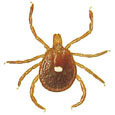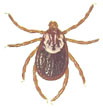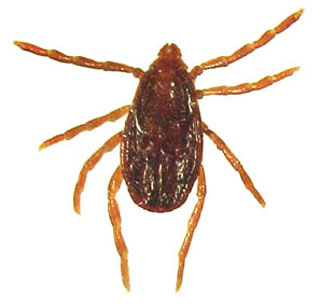Tick Species
Ticks, second to the mosquitoes, are the most medically important arthropods. They are exclusively parasitic and feed only on vertebrate blood. Ticks are not only annoying pests, but transmit various disease-causing agents including bacterium, virus, protozoa, and rickettsia to man, his livestocks, and his pets.
The emergence of Lyme disease in the early 1980's, sparked a flurry of activity in the Northeast and elsewhere in an attempt to better understand the ecology of tick vectors. This has resulted in a diverse body of information regarding the capacity of ticks, especially Ixodes scapularis,to transmit infectious agents. The majority if tick species that vector disease-causing pathogens are "three-host" tick species with each of the three trophic stages - larva, nymph, and adult - taking a blood only once as the sole nutrient requirement. Briefly, the typical tick life cycle begins when the eggs are deposited by females which previously fed to repletion and dropped to the ground. Within a few weeks to months, the eggs hatch into six-legged larvae. Larvae will then attach to a variety of hosts, feed to full engorgement, drop to te ground larvae and metamorphose into eight-legged nymphs. These newly molted nymphs feed on many the same species of animals as do larva. After feeding to repletion and dropping from their hosts, the engorged nymphs require a month or so to transform to the adult stage. The adults then become active, preferring to feed on larger animals. Male ticks normally don't feed; their primary biological significance is to mate with the feeding females. The female takes a single bloodmeal and dies after laying several thousand eggs.
There are primarily three tick species of public health importance in New Jersey. The links below will provide further information regarding these ticks, including the diseases they transmit, their life cycles, how to control them and how to identify them.




Page Last Updated: 4/5/2016 2:58:00 PM